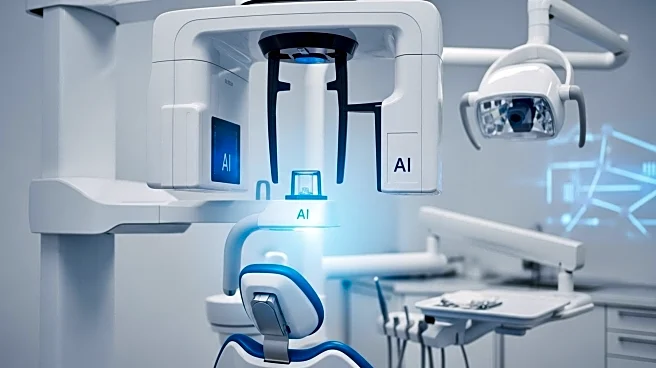What's Happening?
A new dataset, DenPAR, has been developed to improve the detection and diagnosis of dental diseases using artificial intelligence and machine learning. The dataset consists of 1000 intra-oral periapical radiographs, annotated with key dental landmarks such as tooth segmentation masks, Cemento-Enamel Junction (CEJ) points, apex points, and alveolar crestal bone levels. This comprehensive dataset aims to facilitate the development of AI models that can automatically detect dental diseases, thereby enhancing diagnostic accuracy and efficiency. The dataset is expected to be a valuable resource for training models in teeth segmentation, keypoint detection, and alveolar bone level identification, ultimately contributing to advanced clinical decision support systems.
Why It's Important?
The introduction of the DenPAR dataset is significant as it addresses the growing need for accurate and efficient dental disease diagnosis. With oral diseases affecting 3.5 billion people globally, early detection is crucial for effective management and treatment. By leveraging AI and machine learning, the dataset can help reduce diagnostic errors and improve treatment outcomes. This advancement is particularly important for the U.S. healthcare system, where dental diseases can lead to severe health complications if left untreated. The dataset's potential to enhance AI-driven diagnostic tools could lead to better patient care and reduced healthcare costs.
What's Next?
The DenPAR dataset is expected to be utilized by researchers and developers to create and refine AI models for dental diagnostics. As these models become more sophisticated, they could be integrated into clinical practice, providing dentists with powerful tools to improve patient outcomes. The dataset's availability may also encourage further research into AI applications in dentistry, potentially leading to new innovations in dental care technology.
Beyond the Headlines
The use of AI in dental diagnostics raises ethical considerations regarding patient privacy and data security. As AI systems become more prevalent, ensuring the protection of sensitive patient information will be crucial. Additionally, the integration of AI into clinical practice may require changes in dental education and training, as practitioners will need to understand and effectively use these new technologies.











